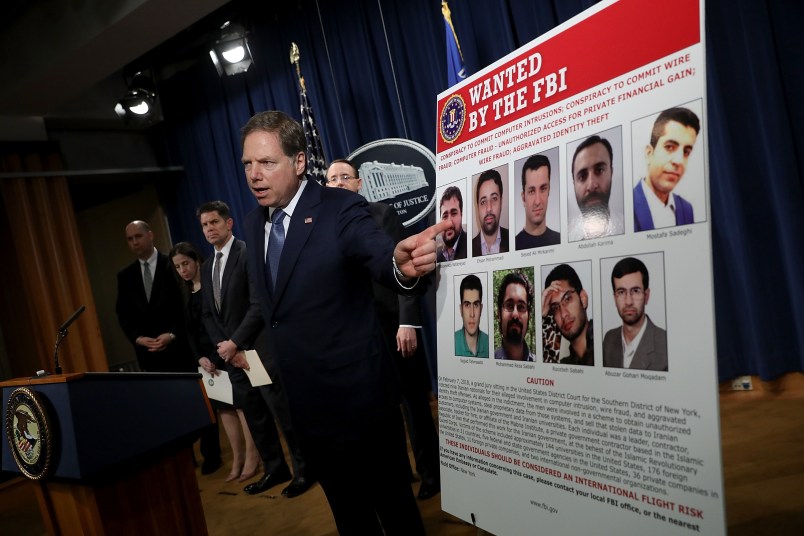An interim U.S. attorney appointee who was personally interviewed by President Trump last year will stay indefinitely in his post, potentially giving him influence over the unfolding federal probes of Trump and his associates.
Judges in the Southern District of New York voted unanimously last week to keep Geoffrey Berman as Manhattan’s top federal prosecutor for the time being. Berman was one of 17 interim attorneys appointed by Attorney General Jeff Sessions in January to serve 120-day terms under the Justice Department’s vacancy policy — a deadline set to expire on May 4.
The White House has yet to formally nominate US attorneys in key judicial districts, including the SDNY. Berman will serve in his post until Trump nominates, and the Senate confirms, a permanent replacement.
Until then, Berman, a donor to Trump’s presidential campaign and former law partner of Trump pal Rudy Giuliani, will oversee federal criminal matters in the district where the Trump Organization is based, potentially making him a key player in the sprawling investigation into Russian meddling in the 2016 election and possible collusion with the Trump campaign.
Already, Berman reportedly has recused himself from the federal probe into the business affairs of Trump’s longtime fixer, Michael Cohen. Neither Berman nor his office has explained the recusal, which came before federal agents raided Cohen’s premises earlier this month. The office’s number two, Robert Khuzami, a former top SEC official, has taken charge of the probe.
Miller, the former federal prosecutor, told TPM the recusal was a curious decision.
“It would be typical for you to liberally disclose any potential conflicts,” Miller said, “and then zealously safeguard the independence and conflict-of-interest free operation of any U.S. Attorney’s office, let alone the Southern District of New York.”
But the situation underscores how the Trump administration has flouted the typical process for filling these critical posts in the U.S. justice system.
“One would expect the judges would be acting in a non-partisan capacity and would only appoint him if they had a great deal of confidence in his impartiality and professionalism,” former federal prosecutor Steven Miller told TPM in a phone interview. Still, Miller called the situation “unusual.”
Trump has not given any explanation for his decision not to formally nominate Berman, but Sen. Kirsten Gillibrand (D-NY) promised to block Berman’s nomination over his one-on-one interview with Trump, which was first revealed in October 2017. The President also sat for interviews with Jessie Liu, who was confirmed last summer as U.S. attorney for the District of Columbia, and Ed McNally, a partner at the firm of Trump’s own onetime lawyer Mark Kasowitz, who was floated as U.S. attorney for New York’s Eastern District.
All three jurisdictions are relevant to the federal Russia investigation.
At the time of Berman’s appointment, Gillibrand spokesman Glen Caplin said that receiving the stamp of approval from Trump presented conflicts of interest given “potential jurisdiction on matters that could affect the president personally.”
Caplin followed up with another statement last Wednesday blaming Trump for attempting “to undermine our institutions by doing an end-run around the U.S. Senate’s advise and consent responsibility for U.S. attorney nominations.”
Gillibrand’s fellow New York Democrat, Senate Minority Leader Chuck Schumer, also reportedly told the White House back in January that he was “not supportive” of Berman’s nomination.
Robert Costello, former deputy chief of the criminal division in the Southern District U.S. Attorney’s Office, told TPM that concerns about Berman’s potential conflicts were overblown. As Costello pointed out, the former U.S. Attorney in the district, Preet Bharara, served as Schumer’s chief counsel prior to his appointment.
This winding series of affairs was set into motion last March with Sessions’ firing of 46 U.S. attorneys held over from the Obama era — a fairly standard move for a new administration. Trump has since nominated 65 people to fill the 93 total U.S. attorney positions, 63 of whom been confirmed.
Then in January, Sessions used his executive authority to step in and appoint 17 interim U.S. attorneys. That announcement came one day before the acting U.S. attorneys filling in after the mass March 2017 dismissal hit the 300-day deadline limiting how long they can legally serve.
The White House did not respond to TPM’s requests for comment on whether Trump would nominate Berman, or on the delay in rolling out the rest of his nominations.
A Justice Department spokeswoman told TPM she would defer to the White House on the timeline for filling these posts. For now, local district courts will, as in New York, appoint people to hold them until Trump and Congress can agree on permanent selections.










